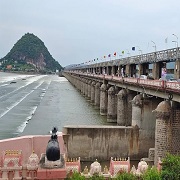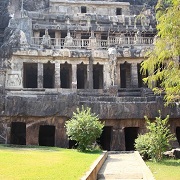


About Vijayawada
Vijayawada, also known as Bezawada, is one of the major cities in the Indian state of Andhra Pradesh. Located on the banks of the Krishna River, the city is a crucial cultural, political, and economic hub for the state. It is known for its rich history, vibrant traditions, and modern urban development, making it an important destination in southern India.
The history of Vijayawada dates back to ancient times, with references found in various mythological texts and historical accounts. According to legend, the name "Vijayawada" is derived from the victory of the Goddess Durga over the demon Mahishasura. The city is believed to be the location where Goddess Durga rested after her battle, hence the name "Vijaya" (victory) and "wada" (place).
Vijayawada has been ruled by various dynasties, including the Satavahanas, Pallavas, Chalukyas, and the Vijayanagara Empire. During the Satavahana period, the city was a prominent trading center. It later became part of the Eastern Chalukya kingdom and flourished under the Vijayanagara rulers. The arrival of the British in the 19th century brought further development to the city, particularly in terms of infrastructure and trade. The construction of the Prakasam Barrage over the Krishna River, completed in 1957, further boosted the city's prominence as a trade and agricultural center.s
Places to Visit in Vijayawada• Kanaka Durga Temple: One of the most famous temples in Vijayawada, this shrine is dedicated to Goddess Kanaka Durga, the presiding deity of the city. Located on the Indrakeeladri Hill, the temple offers stunning views of the Krishna River. The Navaratri festival is celebrated with great fervor here.
• Bhavani Island: Located on the Krishna River, Bhavani Island is a serene getaway with lush greenery and water sports activities. Visitors can enjoy boating, picnicking, and various adventure sports here.
• Undavalli Caves: These ancient rock-cut caves date back to the 4th and 5th centuries and are one of the finest examples of Indian rock-cut architecture. The caves are believed to have been a Buddhist monastery and later were adapted by Hindu and Jain monks. • Victoria Jubilee Museum: This museum houses an impressive collection of sculptures, artifacts, paintings, and inscriptions from different periods of Vijayawada's history. It provides insight into the region's rich cultural heritage. • Mangalagiri: Located close to Vijayawada, Mangalagiri is famous for its ancient temple dedicated to Lord Narasimha. The town is also known for its handloom products, particularly the Mangalagiri saris. • Kondapalli Fort: Situated on the outskirts of Vijayawada, this historical fort dates back to the 14th century and offers a glimpse into the region's past. The Kondapalli village nearby is also renowned for producing Kondapalli toys, traditional wooden dolls and figurines. • Rajiv Gandhi Park: A beautiful landscaped park that offers a peaceful retreat for visitors. It has a mini zoo, musical fountain, and is a popular spot for families to relax. • Gandhi Hill: Located close to the city, Gandhi Hill has a memorial dedicated to Mahatma Gandhi. It offers panoramic views of the city and is a great place for a peaceful evening stroll. • Subramanya Swamy Temple (ISKCON Vijayawada): This temple is dedicated to Lord Krishna and is managed by the International Society for Krishna Consciousness (ISKCON). It is a spiritual retreat for those seeking peace and devotion. • Amaravati: Located about 30 km from Vijayawada, Amaravati is an ancient town known for its Amaravati Stupa, one of the largest Buddhist stupas in India. It is also the location of the Amaralingeswara Temple, an important Shiva temple. The region holds historical significance as a major center of Buddhism in ancient times. • Hamsaladeevi: Located around 85 km from Vijayawada, Hamsaladeevi is where the Krishna River meets the Bay of Bengal. It is known for its scenic beauty, a small beach, and the Venugopala Swamy Temple, making it a serene and spiritual destination.• Machilipatnam: About 70 km from Vijayawada, Machilipatnam is a coastal town with historical importance as a trading port during the British era. The town is known for its beaches and the Manginapudi Beach, which is popular among tourists for its black sand and calm waters.
• Mogalarajapuram Caves: Located about 5 km from Vijayawada, these ancient Mogalarajapuram Caves date back to the 5th century. The caves house three temples, and one of the cave temples contains an idol of Lord Nataraja, making it a significant historical site.
• Kolleru Lake: Located around 65 km from Vijayawada, Kolleru Lake is one of the largest freshwater lakes in India. It is a haven for migratory birds, making it a paradise for bird watchers and nature enthusiasts. The lake is also a Ramsar wetland site, emphasizing its ecological significance.:
• Suryalanka Beach: Around 90 km from Vijayawada, Suryalanka Beach near Bapatla is a popular beach destination. It offers a clean, peaceful atmosphere perfect for relaxation, swimming, and weekend getaways.
• Papi Hills (Papi Kondalu): Located around 100 km from Vijayawada, Papi Hills is a picturesque spot along the Godavari River, offering stunning views of the hills and the river. The region is known for its scenic boat rides through the lush hills and dense forests, making it a popular eco-tourism destination.
• Manginapudi Beach: Around 70 km from Vijayawada, Manginapudi Beach in Machilipatnam is known for its pristine sands and calm waters. It is a serene location to unwind and enjoy a day by the sea.
Vijayawada's mix of historical, religious, and natural sites makes it an attractive destination for travelers interested in culture, history, and nature.